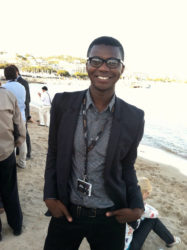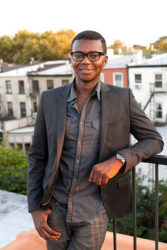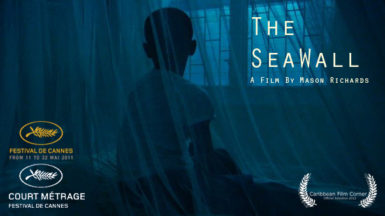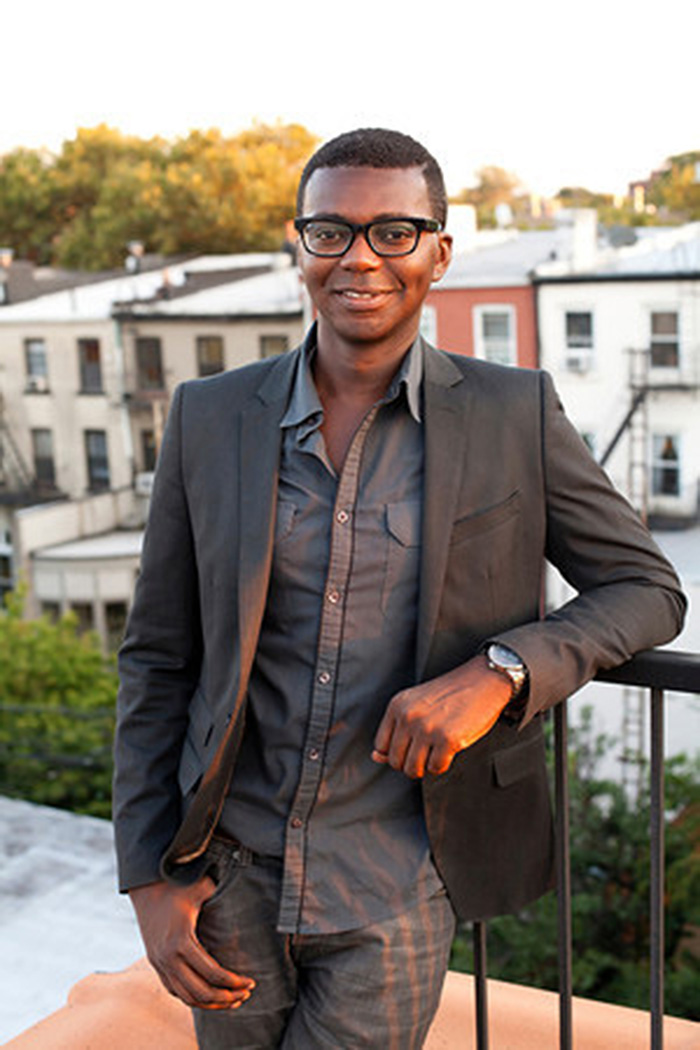Award winning US-based Guyanese filmmaker, writer and director Mason Richards was in Guyana only recently scouting locations for when he returns later in this year when the production of his full-length film is slated to begin. The film, The Seawall is sort of his story and one which many Guyanese abroad can relate to. It depicts the life of a little boy taken from Guyana to live abroad; the seawall he saw as the only barrier between Guyana and the rest of the world. Already done as a short film, The Seawall took Mason places such as the Cannes Film Festival in France and Havana, Cuba where it was well received.

The journey for Mason was a difficult one but perseverance led him to not only being the first Guyanese but also the first person to direct the first ever all black theatre production in the history of the Vanderbilt University that he once attended. Later, The Seawall was recognized by Sony Pictures, and Mason won a huge award, another first for a Guyanese.
However, his love for film began many years ago when on blackout nights he listened to folklore tales or was taken for a drive-in at the Starlight Cinema here in Guyana to watch the old black and white Hollywood movies. “I think,” Mason said, “that was the beginning of my passion for films.
“I grew up in Campbellville/ Kitty and was seven years old when I left here with my family for Brooklyn. I was always interested in story telling even as I was a little boy in Guyana. When I was a little boy here, there were blackouts often and my mother would light a candle and my parents would start telling us these stories about mermaids and other jumbie stories.

While in Guyana, he attended the Redeemer Primary School and after migrating Mason attended the Mabel Dean Bacon High before transferring to City-As-School High School. Then at 17, having worked hard in hope of being awarded a scholarship to Vanderbilt University, which allowed only ten from each city across America, he was successful.
“I applied for the scholarship and was one of the ten who won the scholarship called the ‘Posse Scholarship’. When I won I knew my life was going to change. While at Vanderbilt, I studied Human and Organization Development, and English. When I was there I directed the first ever all black theatre production in the history of the university. I also started a chapter in the fraternity of the university called Phibeta Sigma. It’s a social club on campus; we’d do events to raise awareness for students of colour on campus,” the filmmaker related.
After leaving Vanderbilt, Mason went on to attend grad school at the California Institute of the Arts (Cal Arts), which was founded by Walt Disney. To say Mason just got

lucky would be an understatement but with determination and perseverance he defied all odds.
According to Mason, Cal Arts is said to be rated number five in film in America and number one worldwide in animation.
“Attending Cal Arts was a big thing for my family; I was the first one to go to college,” he said. During his final year, the students at Cal Arts were expected to do a thesis film as a school project and Guyana came to mind so after leaving as a little boy decades ago, Mason returned to Guyana for the first time in years in 2008. “I chose Guyana,” he said, “because I felt I was uprooted from my home. So I chose to come back here and wrote and made a short film The Seawall.” His return to Guyana he said brought back so many memories that hit him head-on; of jumbie stories in the dark, watching films on the projector screen and climbing coconut trees.
After creating the film he returned to America where The Seawall was shown on the big screen. “The first time I saw my film on a big screen in front of an audience, it was scary because I felt exposed. It’s interesting when you see your life and something that you created and people are reacting to it and relating to it and you feel like you’re impacting them in some way whether it’s good or bad. It’s scary but at the same time, powerful and it made me want to do more,” he said.
“The Seawall also gave them a different outlook of Guyana. Some thought Guyana to be Ghana or to be affiliated only with the Jim Jones story.
“The first time I saw it presented on the big screen by Film Independent in front of a packed audience, I won a huge, huge award presented by Sony Pictures in Hollywood. I received a $10,000 grant to work on my film. That was when I felt validated about making the film. I felt like I contributed to the planet. It gave me validity in Hollywood and in the industry so I felt that it gave me credibility as an artist and as a writer/director in the Hollywood industry. The award [Sony Pictures Diversity New Filmmaker Award] was presented by the senior vice-president of Sony Pictures. Every year they choose one person and that year I was chosen. I felt honoured. I felt a little bit scared because I wanted to live up to this new responsibility. I wanted to do justice to my characters in telling the truth in filmmaking. As Guyanese filmmaker and coloured filmmaker I want to do justice to my story.”
Receiving the award he said would always be a moment to remember.
Mason now has his own company Maurva Productions, based in New York and Los Angeles.
As a writer, Mason is often challenged. “Finding the truth in my story and telling the truth of my characters; that’s hard as a writer. It’s a lot of research. Usually I have blocks and when that happens I have to get out of the space I’m working in and do something different like one of my hobbies or watch a movie and it comes back to me,” he said.
“As a director, one of the challenges is getting the actors to be in the emotional space and the world that you visualize your character should be in.
“And as a filmmaker; the support, money and funding to make a film.”
An all-time favourite writer of his is James Baldwin. He’s also influenced by Indian filmmaker, Sayijit Ray and contemporary filmmaker Terrance Malik.
“Apart from filmmaking, I love philosophy. I’m fascinated with great philosophers like Aristotle. If I had the time or the luxury I’d want to spend time reading to be a great thinker and to understand people; why we love each other, why we hate each other, why we separated from each other; the good and the bad of the mind,” Mason shared.
And as if not satisfied with to having persons delight in his film he thoroughly enjoys watching friends enjoy a good home cooked meal made by none other than himself. So apart from creating films, Mason creates food. “I’m a chef also. If it’s done right, it’s very creative. You have to think about the smell and the taste and you have to think about who you’re preparing for. It’s very nurturing when you’re having a meal together. I like to make comfort foods; Guyanese food. I like to make curries like channa curry. It reminds me of home. And carilla with lots of tomatoes. I hated okro and carilla growing up but now I like them since my mother made me eat it because it was good for me.”
Mason enjoys hobbies such as hiking, yoga and reading his favourite books, among which are The Colour Purple by Alice Walker and Another Country by James Baldwin.
He first started acting in Broadway Theatre and found himself in commercials for public service announcements as a child. Mason also worked with CBS News as an associate producer before working at Paramount Pictures for Sales and Marketing. He later left to pursue his dream in filmmaking.
When Mason started out in theatre he used to stutter. “I was really shy and introverted; I’m still that way a bit now but the more I practised my craft of acting and performance, I was able to gain more confidence and overcome my stuttering. I feel like supporting the arts in school for kids in Guyana can similarly help build confidence in our young ones.
“I started out working in theatre in New York City at an early age. I was 12 years old and started performing as an actor with a theatre company called The CityKids Repertory Company in NYC. We performed all across the US and off-Broadway. At an early age, theatre was a way to build my confidence. As I got older I became more interested in filmmaking – writing and directing but I have a special place in my heart for theatre because it was my first exposure to the arts. I would love to produce and direct a play in Guyana, but now my focus is on producing The Seawall feature film.”
Mason adds, “The film and theatre business is very tough and requires a high level of commitment to be successful. My advice to anyone interested in film or theatre is to realize what you’re best at and focus on that. There are many jobs in film and theater; it’s a very collaborative process, so it’s great when you have a team of people all working together to make it happen. Every job on a film set is important to making a successful film.
“Filmmaking is a craft, so it’s essential that people learn about the business and have training and education on what’s necessary to make a successful film. That’s one of the reasons whenever I visit Guyana I lead free workshops on filmmaking, acting for the camera.
“In the future I expect to produce my feature film in Guyana and become a resource for filmmakers, actors and creative persons in Guyana. I’d like to start running regular film workshops in Guyana to share my knowledge of what I’ve learned working in Hollywood and with my MFA in Film Directing from Cal. Arts….
“I also expect to see a thriving film and television industry/community in Guyana where we are producing more creative content within our community and developing local talent and telling our stories. It’s always great when we can see ourselves on film… it can bring joy [to] take another look at our humanity, or culture and our identity.
“….I hope to continue making films, directing and producing projects not just in Guyana but across the Caribbean diaspora and internationally. I’m committed to telling the stories of people we normally don’t see in mainstream international cinema.”






